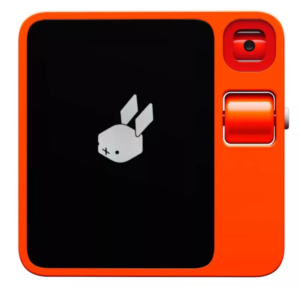Startup Rabbit has unveiled the R1, a wearable handheld device that learns the user’s apps using artificial intelligence and then simplifies the process of using the apps for you. The device is powered by a MediaTek processor, has a push-to-talk button, a 360-degree rotatable camera, Wi-Fi, Bluetooth, and even a 4G SIM card slot. The device costs $199 and is currently on pre-sale.
The R1 has a touchscreen, a push-to-talk button, an analog scroll wheel, a microphone for voice commands, speakers for feedback, and a 360-degree rotating Rabbit Eye camera with Computer Vision support. The device is powered by a MediaTek Helio P35 processor and features 4GB of RAM, 128GB of storage, a USB-C port, Bluetooth, Wi-Fi, and a SIM card slot with 4G support.
A demo on Rabbit’s website shows that the R1 essentially has an operating system based on a large activity model (LAM) called Rabbit OS. This helps the device navigate through all your apps and helps you use them faster than with a regular smartphone. The company claims that its underlying model can learn user intent and behavior when using specific apps, and then mimic them reliably and quickly.
For example, you can link Spotify to the R1 to not only play music using voice commands, but you can also ask the AI to perform contextual tasks, such as playing other tracks from the same album. You can ask R1 to tell you who wrote the lyrics, who composed the music, and more. It’s like talking to ChatGPT, but the company claims the R1’s responses are much faster.
With linked apps like Uber, you can ask the R1 to book you a ride home from the office, and it completes the task in one step versus the multiple steps you’d otherwise take to book a taxi yourself. You can even give commands like “find me an Uber that fits me and my six friends” and the R1 will book an UberXL instead of a regular Uber.
The Rabbit R1 is available for pre-order for $199. Orders will start shipping in the US in March. At startup, the R1 is trained to run the most popular applications. Going forward, it will also get an experimental option that will allow users to train their rabbits to perform specific tasks for niche applications and workflows.
Source: Android Authority

